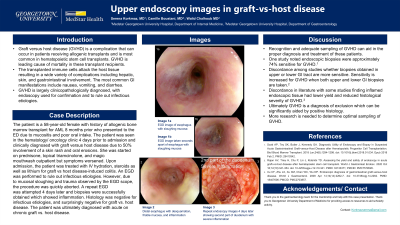Tuesday Poster Session
Category: General Endoscopy
P3433 - Upper Endoscopy Images in Graft-vs-Host Disease
Tuesday, October 24, 2023
10:30 AM - 4:00 PM PT
Location: Exhibit Hall

Has Audio

Serena Korkmaz, MD
MedStar Georgetown University Hospital
Washington, DC
Presenting Author(s)
Serena Korkmaz, MD, Camille Boustani, MD, Walid Chalhoub, MD
MedStar Georgetown University Hospital, Washington, DC
Introduction: Graft versus host disease is a complication that can occur in patients receiving allogenic transplants and is most common in hematopoietic stem cell transplants. The transplanted immune cells attack the host tissue resulting in a wide variety of complications including hepatic, skin, and gastrointestinal involvement. Patients typically present with GI involvement with nausea, vomiting, and diarrhea. Graft vs. host disease is largely clinicopathologically diagnosed, with endoscopy used for confirmation and to rule out infectious etiologies.
Case Description/Methods: The patient is a 58-year-old female with history of allogenic bone marrow transplant for AML 8 months prior who presented to the ED due to mucositis and poor oral intake. The patient was seen in the hematology/ oncology clinic 4 days prior to admission and clinically diagnosed with graft versus host disease due to 50% involvement of a skin rash and oral erosions. She was started on prednisone, topical triamcinolone, and magic mouthwash outpatient but symptoms worsened. Upon admission, the patient was treated with IV hydration, steroids as well as lithium for graft vs host disease-induced colitis. An EGD was performed to rule out infectious etiologies. However, due to mucosal sloughing and trauma observed by the EGD scope, the procedure was quickly aborted. A repeat EGD was attempted 3 days later and biopsies were successfully obtained which showed inflammation and negative infectious etiologies. Surprisingly, histology was negative for graft vs. host disease. The patient was ultimately diagnosed with acute on chronic graft vs. host disease.
Discussion: Graft vs. host disease is largely clinicopathologically diagnosed, and biopsies can help rule out infectious etiologies that may contribute to the patient’s condition. One small study noted endoscopy biopsies were around 70% sensitive for graft vs. host disease. Recognition and adequate sampling by endoscopists can aid in the proper diagnosis and treatment of these patients.

Disclosures:
Serena Korkmaz, MD, Camille Boustani, MD, Walid Chalhoub, MD. P3433 - Upper Endoscopy Images in Graft-vs-Host Disease, ACG 2023 Annual Scientific Meeting Abstracts. Vancouver, BC, Canada: American College of Gastroenterology.
MedStar Georgetown University Hospital, Washington, DC
Introduction: Graft versus host disease is a complication that can occur in patients receiving allogenic transplants and is most common in hematopoietic stem cell transplants. The transplanted immune cells attack the host tissue resulting in a wide variety of complications including hepatic, skin, and gastrointestinal involvement. Patients typically present with GI involvement with nausea, vomiting, and diarrhea. Graft vs. host disease is largely clinicopathologically diagnosed, with endoscopy used for confirmation and to rule out infectious etiologies.
Case Description/Methods: The patient is a 58-year-old female with history of allogenic bone marrow transplant for AML 8 months prior who presented to the ED due to mucositis and poor oral intake. The patient was seen in the hematology/ oncology clinic 4 days prior to admission and clinically diagnosed with graft versus host disease due to 50% involvement of a skin rash and oral erosions. She was started on prednisone, topical triamcinolone, and magic mouthwash outpatient but symptoms worsened. Upon admission, the patient was treated with IV hydration, steroids as well as lithium for graft vs host disease-induced colitis. An EGD was performed to rule out infectious etiologies. However, due to mucosal sloughing and trauma observed by the EGD scope, the procedure was quickly aborted. A repeat EGD was attempted 3 days later and biopsies were successfully obtained which showed inflammation and negative infectious etiologies. Surprisingly, histology was negative for graft vs. host disease. The patient was ultimately diagnosed with acute on chronic graft vs. host disease.
Discussion: Graft vs. host disease is largely clinicopathologically diagnosed, and biopsies can help rule out infectious etiologies that may contribute to the patient’s condition. One small study noted endoscopy biopsies were around 70% sensitive for graft vs. host disease. Recognition and adequate sampling by endoscopists can aid in the proper diagnosis and treatment of these patients.

Figure: Sloughing of esophageal mucosa was observed upon introduction of the endoscope
Disclosures:
Serena Korkmaz indicated no relevant financial relationships.
Camille Boustani indicated no relevant financial relationships.
Walid Chalhoub indicated no relevant financial relationships.
Serena Korkmaz, MD, Camille Boustani, MD, Walid Chalhoub, MD. P3433 - Upper Endoscopy Images in Graft-vs-Host Disease, ACG 2023 Annual Scientific Meeting Abstracts. Vancouver, BC, Canada: American College of Gastroenterology.
